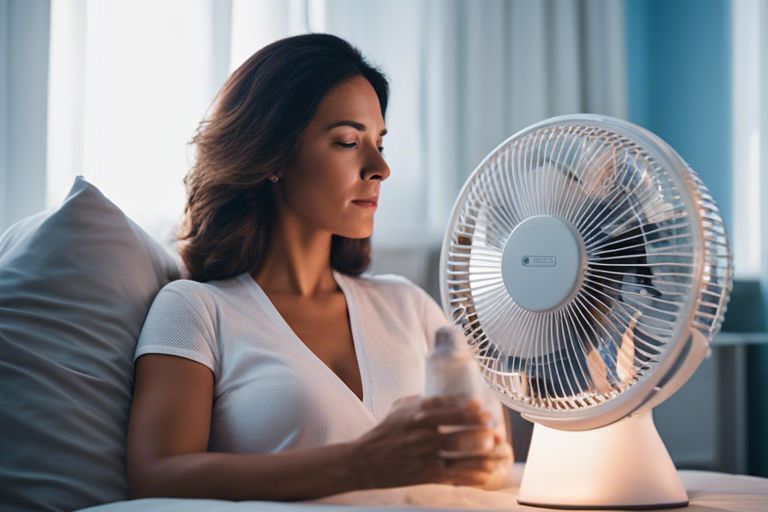Menopause is a natural phase in a woman’s life, but the symptoms can often be challenging to manage. Many women seek relief from these symptoms through natural remedies, but it can be difficult to discern what truly works among the plethora of options available. In this informative blog post, we will explore some of the most effective natural remedies for menopause symptoms, backed by research and expert recommendations. From herbal supplements to lifestyle changes, we will probe into the world of natural remedies to help you navigate through menopause with ease and confidence.
Key Takeaways:
- Herbal remedies such as black cohosh and soy isoflavones have been found to help reduce menopause symptoms.
- Acupuncture may offer relief for hot flashes and mood swings during menopause.
- Physical exercise can help manage menopause symptoms like weight gain and mood changes.
- Healthy diet rich in fruits, vegetables, and whole grains can alleviate menopause symptoms such as hot flashes and night sweats.
- Consult a healthcare professional before trying any natural remedy to ensure it is safe and suitable for your individual needs.
Dietary Adjustments for Menopause
Phytoestrogens and Their Sources
Phytoestrogens are plant compounds that mimic the hormone oestrogen in the body. Including sources of phytoestrogens in your diet can help alleviate menopausal symptoms such as hot flushes and night sweats. Good sources of phytoestrogens include soy products, flaxseeds, sesame seeds, and lentils.
Essential Nutrients and Where to Find Them
Essential nutrients play a crucial role in supporting overall health during menopause. Key nutrients like calcium, vitamin D, and omega-3 fatty acids are vital for bone health, mood regulation, and heart health. Calcium can be found in dairy products, leafy greens, and almonds; vitamin D is synthesized by the body when exposed to sunlight; and omega-3 fatty acids are abundant in fish such as salmon and mackerel.
It is important to ensure you are getting an adequate intake of imperative nutrients during menopause to support your overall well-being. Including a variety of nutrient-rich foods in your diet can help alleviate symptoms and promote a smooth transition through this stage of life.
Herbal Supplements and Botanicals
Black Cohosh: Benefits and Precautions
Black Cohosh is a popular herbal supplement used by menopausal women to alleviate hot flushes, mood swings, and sleep disturbances. Research suggests that Black Cohosh may help reduce the frequency and severity of these symptoms. However, it is important to consult a healthcare professional before taking Black Cohosh, as it may have interactions with certain medications and medical conditions. Some women experience side effects such as gastrointestinal upset, headaches, and dizziness after taking Black Cohosh.
St. John’s Wort and Menopausal Mood
St. John’s Wort is a herbal remedy that has been traditionally used to treat mild to moderate depression and improve mood. Some menopausal women find relief from mood swings, irritability, and anxiety by taking St. John’s Wort. However, it’s crucial to be aware of potential interactions with other medications, such as contraceptives and antidepressants. Consulting a healthcare provider is crucial before incorporating St. John’s Wort into your menopausal symptom management plan.
Lifestyle Changes and Alternative Therapies
Exercise and Stress Reduction Techniques
Exercise and stress reduction techniques play a crucial role in managing menopause symptoms. Regular physical activity, such as yoga or brisk walking, can help alleviate hot flushes, improve mood, and enhance overall well-being. Additionally, incorporating stress-reducing practices like meditation and deep breathing can help in reducing anxiety and promoting relaxation, which are common challenges faced during menopause.
Acupuncture and Aromatherapy
Acupuncture and aromatherapy are alternative therapies that have shown promising results in alleviating menopause symptoms. Acupuncture involves the insertion of thin needles into specific points of the body to help regulate hormone levels and reduce hot flushes. Aromatherapy, on the other hand, uses important oils extracted from plants to promote relaxation, improve sleep quality, and reduce mood swings. While more research is needed to fully understand their mechanisms, many women have reported positive effects from these holistic approaches.
Risks and Considerations
Interactions with Medications
It is crucial to be aware of potential interactions between natural remedies for menopause symptoms and any medications you may be taking. Some herbs and supplements can interfere with the effectiveness of certain medications or cause adverse reactions. Always consult with your healthcare provider before starting any new natural remedy to ensure it is safe to use alongside your current medications.
When to Seek Professional Medical Advice
If you are experiencing severe menopause symptoms that are disrupting your daily life, it is important to seek professional medical advice. Symptoms such as extreme hot flashes, mood swings, or irregular bleeding could indicate underlying health issues that require medical attention. Your healthcare provider can help determine the cause of your symptoms and recommend appropriate treatment options.
Do not hesitate to seek medical advice if you have concerns about your menopause symptoms, as early intervention can help manage your symptoms effectively and improve your overall quality of life during this transitional phase.
Natural Remedies for Menopause Symptoms – What Works?
After exploring various natural remedies for menopause symptoms, it is evident that certain options have shown promise in alleviating the discomfort that comes with this phase of life. Herbal remedies such as black cohosh and evening primrose oil have demonstrated effectiveness in managing hot flashes and mood swings. Additionally, incorporating a healthy lifestyle, including regular exercise and a balanced diet rich in calcium and vitamin D, can help in reducing the severity of menopausal symptoms. However, it is crucial to consult with a healthcare provider before trying any natural remedy to ensure its safety and appropriateness for individual needs. By making informed choices and taking a holistic approach, women can find relief and manage menopause symptoms effectively with natural remedies.
FAQ
Q: What are natural remedies for menopause symptoms?
A: Natural remedies for menopause symptoms include herbal supplements like black cohosh, red clover, and dong quai, as well as lifestyle changes such as regular exercise, a healthy diet, and stress management techniques.
Q: Do natural remedies work for menopause symptoms?
A: Natural remedies have been found to be effective for some women in managing menopause symptoms, but individual responses may vary. It is recommended to consult with a healthcare provider before trying any natural remedies.
Q: How can black cohosh help with menopause symptoms?
A: Black cohosh is a herbal supplement that has been shown to help alleviate hot flashes, night sweats, and mood swings associated with menopause. It is believed to have estrogen-like effects in the body.
Q: Are there any risks associated with using natural remedies for menopause symptoms?
A: Some natural remedies, such as black cohosh, may have side effects or interact with other medications. It is important to discuss any supplements or remedies with a healthcare provider to ensure they are safe for you to use.
Q: What lifestyle changes can help manage menopause symptoms?
A: Lifestyle changes that can help manage menopause symptoms include regular exercise to reduce hot flashes and improve mood, maintaining a healthy diet rich in fruits, vegetables, and whole grains, and practising stress-reducing techniques such as yoga or meditation.






